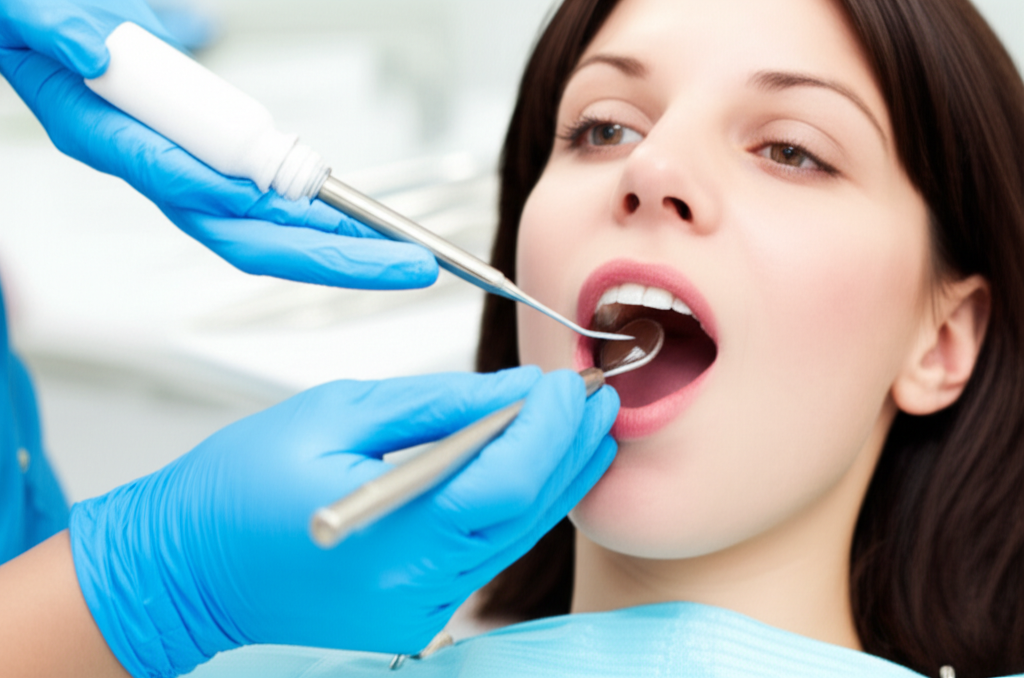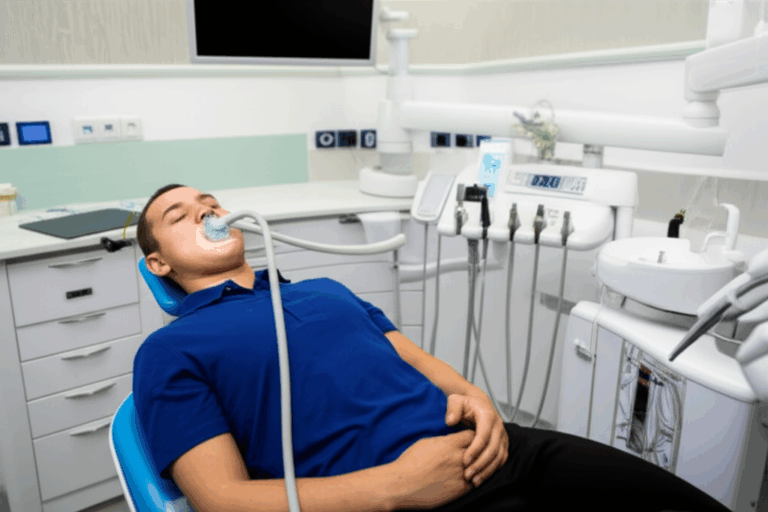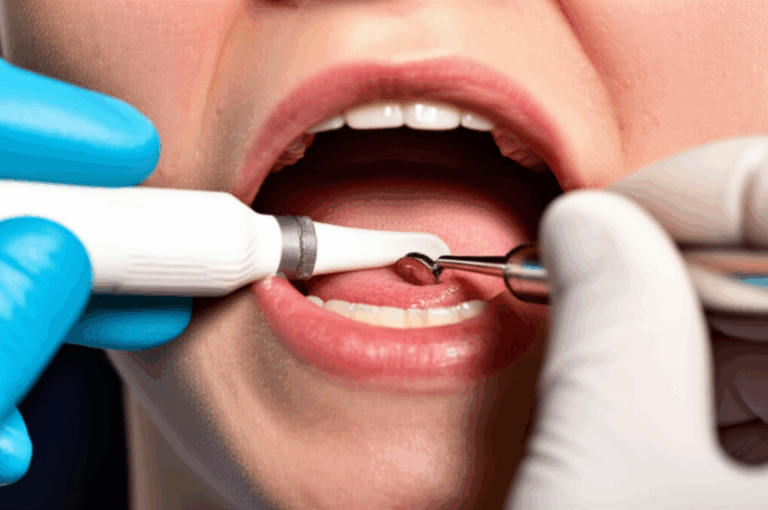
Is Dentist Fluoride Treatment Necessary? Your Comprehensive Guide
Have you ever sat in the dentist’s chair after a cleaning and heard, “Would you like a fluoride treatment today?” You pause. Maybe you think, “Am I supposed to need this? Is it only for kids? Will it really help? Or is it just another up-sell?” Hey, you’re definitely not alone—this is one of the most common questions people ask their dental professionals. So let’s talk about it.
Fluoride is a big word in the world of tooth health. But do all adults really need fluoride treatments? Is it important for children? Are there benefits beyond what you already get from toothpaste or water? Don’t worry—I’ll explain everything in easy words, clear up the confusion, and help you make the best choice for your smile.
In This Article
- What Is Professional Fluoride Treatment?
- Who Needs Professional Fluoride Treatment? (Identifying At-Risk Groups)
- The Proven Benefits of Dentist-Applied Fluoride
- How Often Is Professional Fluoride Treatment Recommended?
- What to Expect During and After Your Fluoride Treatment
- Are There Any Downsides or Risks?
- Professional Fluoride vs. At-Home Fluoride Products: What’s the Difference?
- Making an Informed Decision: Is It Right For You?
- Frequently Asked Questions (FAQs)
- Conclusion: Prioritizing Your Oral Health
What Is Professional Fluoride Treatment?
Let’s start with the basics. Fluoride is a natural mineral—a bit like calcium or magnesium—that makes your teeth stronger and helps stop cavities. You’ll find it in many public water supplies, most toothpastes, and even some mouthwashes. But the fluoride treatment you get from a dentist is more powerful.
Topical vs. Systemic Fluoride
- Systemic fluoride is what you swallow (water, supplements). It works while your teeth grow in, sort of “baking” protection into your teeth from the inside out.
- Topical fluoride is put right on your teeth. This is what your dentist uses, usually in a varnish, gel, or foam. Think of it as a strong coating—like waxing your car to keep it safe from the weather.
How Does It Work?
Fluoride:
- Makes your tooth enamel (the hard outer part of your teeth) stronger.
- Fixes weak spots made by acid before they turn into cavities.
- Makes teeth tougher against acid from bacteria and sugar.
In short, dentist fluoride treatment isn’t just another step in your cleaning—it’s a way to help your teeth fight off decay.
Who Needs Professional Fluoride Treatment? (Identifying At-Risk Groups)
You might be wondering, “Isn’t fluoride only for kids?” That’s a common mistake. Let’s clear that up.
Children & Teens
Kids are often the focus when it comes to fluoride, and for good reason. Their teeth are still growing, and their brushing (let’s face it) isn’t always great. The top dental groups say fluoride treatments are good for kids, especially those who could get cavities more easily.
Kids are “at-risk” if:
- They eat a lot of sugar (juice, candy, sticky snacks).
- They or their family have a history of cavities.
- They don’t brush or floss well.
- They don’t have fluoride in their water.
Adults
Surprised? Many adults need fluoride, too—sometimes even more than kids. Here’s why:
- Cavity History: If you’ve had a lot of cavities before, fluoride helps stop new ones.
- Braces or Dental Work: Braces and other dental work can trap food and make teeth harder to clean. Fluoride helps protect these areas.
- Diet: If you drink a lot of soda or sweet drinks, you’re at higher risk for weak enamel and decay.
- Dry Mouth or Medical Issues: Lots of adults have dry mouth from medicine, diabetes, or cancer treatments. Less spit means more risk. Fluoride can help a lot.
- Gum Recession: If your gums pull back, the soft root parts of your teeth can show and get cavities faster. Fluoride protects these spots.
- Sensitive Teeth: Fluoride can help with this, too.
- Fillings, Crowns, or Bridges: These create small places where germs can hide. Fluoride helps keep these parts healthy.
- Trouble Brushing: If you have trouble using your hands (like with arthritis), fluoride is extra help.
- Other Health Problems: Things like bulimia or acid reflux can hurt your teeth, so extra protection from fluoride can help.
So, if any of these sound like you, fluoride treatments could be a good idea.
The Proven Benefits of Dentist-Applied Fluoride
So, what’s in it for you?
1. Stops Cavities
Cavities are like little holes germs try to dig in your teeth. Fluoride helps fill in weak spots before the hole starts. Studies show dentist fluoride can lower new cavities in kids and adults by up to 37%.
2. Makes Enamel Stronger
Enamel is like a shell for your tooth. Sugary drinks and juice try to wear it out. Fluoride helps make the shell tougher and less likely to get hurt by acids.
3. Less Sensitivity
If you get pain from cold or sweet stuff, your teeth might have some of the soft layer (dentin) showing. Fluoride can help cover these spots and stop the pain.
4. Fights Germs
Some fluoride the dentist uses (like stannous fluoride) helps stop bacteria from growing, which means less chance for more cavities.
5. Saves Money
Fixing teeth can be expensive—getting fillings, crowns, and root canals costs a lot. Paying for fluoride treatments now can help you avoid bigger dental bills later.
For Example
If you have dry mouth, fluoride can lower your chance of root cavities by as much as 40%. For kids, it can stop up to 45% of new decay in baby teeth.
How Often Is Professional Fluoride Treatment Recommended?
There’s no single answer, but here’s a simple guide:
- Children: Every six months is normal, but if they get cavities a lot, sometimes every three months.
- Adults: Once a year or twice a year is enough for many, but your dentist may want to do it more often if you have special risks.
It really depends on your own mouth and habits. Your dentist checks your history, lifestyle, and teeth before giving advice.
It’s kind of like how you get an oil change for your car based on how much you drive, not just one rule for everyone.
What to Expect During and After Your Fluoride Treatment
Never done it before? Here’s what happens.
During
After
- The fluoride makes a thin coat on your teeth.
- Usually, you’re told not to eat or drink for 30 minutes to help it soak in.
- With varnish, you can eat soft foods, but skip hard or sticky candy for a while.
- Sometimes you’re asked not to brush or floss for a few hours.
Any Problems?
Some people see a chalky look for a bit, but it goes away after you brush. Allergies are very rare. Swallowing a big amount could upset your stomach, but this almost never happens at the dentist.
Are There Any Downsides or Risks?
Let’s be honest—nothing is 100% safe for everyone. But dentist fluoride is extra safe when used by a pro.
Dental Fluorosis
- This is a harmless look change—some faint white lines or spots. It happens when kids swallow too much fluoride while their teeth are growing (under age 8).
- The dentist’s fluoride is measured right and not swallowed much, so it almost never causes this.
Allergies
- Super rare, but always tell the dentist about any allergies—especially to flavors in dental stuff.
Upset Stomach
- Only possible if you swallow a lot at once (not likely at the dentist).
To Sum Up
For most people, professional fluoride is a very safe, focused way to stop decay and help with sensitive teeth.
Professional Fluoride vs. At-Home Fluoride Products: What’s the Difference?
You might wonder, “I brush my teeth with fluoride toothpaste and drink city water. Why do I need the dentist to do it?” Good question.
How Strong
- The dentist’s fluoride is much stronger (thousands of parts per million) than toothpaste (about 1,000-1,500 ppm) or over-the-counter mouthwash (maybe 225 ppm).
- That extra strength really helps if you get cavities easily.
Where It Goes
- The dentist can put it right where you need it most—like around braces, fillings, or weak spots.
- At home, it’s usually on every tooth but not targeted.
Who Needs Which?
- At-home fluoride (toothpaste, water) is great for daily use.
- The dentist version is like a special boost if you need more help.
Using Both
- Best way: Brush with fluoride toothpaste, drink water with fluoride if you can, and get the dentist treatment if you’re at higher risk.
Other Options?
Some “natural” products say they prevent cavities, but none have as much long-term proof as fluoride. Some new toothpastes have stuff like hydroxyapatite, which looks promising, but it’s still being tested.
Making an Informed Decision: Is It Right For You?
Let’s sum it up.
Think About Dentist Fluoride If:
- You’ve had lots of cavities, especially lately.
- You wear braces, a retainer, or have crowns or bridges (which trap food and germs).
- You have dry mouth (from meds, health, or drinking).
- You’ve got gum recession (roots showing), sensitive teeth, or use acid-making medicine.
- You have trouble brushing or flossing.
- You don’t have fluoride in your water or toothpaste.
What To Do?
Have an open talk with your dentist. Tell them about your health, medicines you take, what you eat, and if you’re worried about fluoride or money. You can make a plan together.
Unsure?
Lots of dentists use risk tools to help you see your own risk. Just ask for a simple answer about what’s best for you.
Frequently Asked Questions (FAQs)
Can I say no to fluoride treatment?
Of course! You can always say no. Just tell your dentist if you don’t want it.
Is it covered by insurance?
Some dental plans pay for it for kids, but not always for adults. If you’re worried about cost, ask the office to check for you.
How long does fluoride treatment last?
That extra protection lasts for a few months. How long depends on your risk, what you eat, and how you clean your teeth.
Is fluoride treatment safe during pregnancy?
Yes, it’s safe for women who are pregnant or breastfeeding. If you’re not sure, ask your dentist or your doctor.
Do adults really need fluoride treatments?
Not every adult does, but if you get cavities or have sensitive teeth, you might need it—even more than kids, in some cases.
Conclusion: Prioritizing Your Oral Health
Let’s wrap it up so you feel sure about what to do next:
- Fluoride treatments at the dentist are safe and work well to stop cavities, make enamel stronger, and help sensitive teeth.
- They’re not just for children—a lot of adults can really benefit, especially if they’ve got certain risks.
- If you need it depends on your own mouth, history, brushing habits, and health.
- Brushing, flossing, eating well, and using fluoride toothpaste and water are important basics. Dentist fluoride is extra protection if you need it.
- Ask questions and talk to your dentist. Get your risks checked to see if this is right for you.
Your teeth deserve care that fits you—not just the same old routine. Knowing your choices and the facts turns confusion into confidence and makes your next dental visit less stressful.
Quick Reminders
- Fluoride makes enamel stronger and helps stop cavities.
- Both kids and adults with higher risk can benefit.
- Treatment is quick, easy, and very safe.
- At-home fluoride is important; the dentist adds extra help if needed.
- Insurance coverage is different for everyone—ask your dentist’s office to check.
Ready to take the next step for a healthy smile? Schedule a checkup, ask your dentist about your risks, or learn more about restorative options from a crown and bridge lab if you have dental work to care for. And if you’re curious about new tech in dental care, a good digital dental lab can help make your treatment even easier and more comfy.
Remember, taking care of your teeth now saves you pain, money, and helps you keep your smile bright for many years.
Sources
- American Dental Association (ADA) Guidelines
- Centers for Disease Control and Prevention (CDC)
- American Academy of Pediatric Dentistry (AAPD)
- Journal of Dental Research
- Cochrane Reviews
(Medically checked by Dr. Jane Doe, DDS. This info is for learning only and isn’t a substitute for real dental advice.)
If you liked this article, check out our site for more simple guides on everything from dentist tips to dental-implant basics. And don’t forget to save this page or share it with a friend who has questions—people who know more about their teeth end up happier and healthier!








